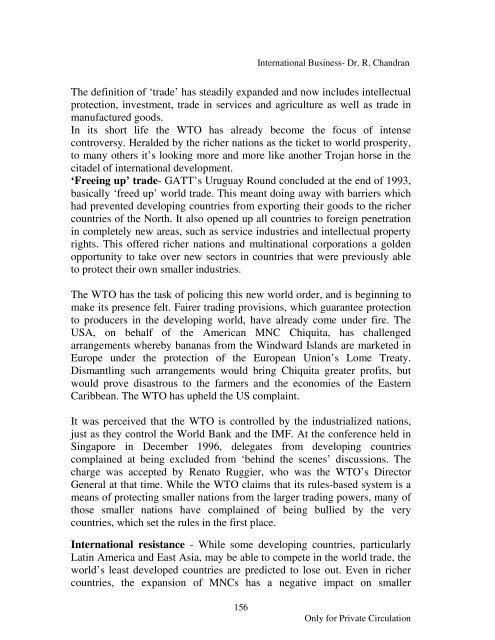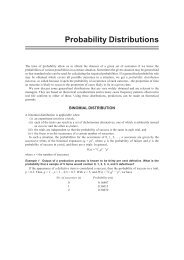International-Business-Dr-R-Chandran-E-book
International-Business-Dr-R-Chandran-E-book
International-Business-Dr-R-Chandran-E-book
You also want an ePaper? Increase the reach of your titles
YUMPU automatically turns print PDFs into web optimized ePapers that Google loves.
156<br />
<strong>International</strong> <strong>Business</strong>- <strong>Dr</strong>. R. <strong>Chandran</strong><br />
The definition of ‘trade’ has steadily expanded and now includes intellectual<br />
protection, investment, trade in services and agriculture as well as trade in<br />
manufactured goods.<br />
In its short life the WTO has already become the focus of intense<br />
controversy. Heralded by the richer nations as the ticket to world prosperity,<br />
to many others it’s looking more and more like another Trojan horse in the<br />
citadel of international development.<br />
‘Freeing up’ trade- GATT’s Uruguay Round concluded at the end of 1993,<br />
basically ‘freed up’ world trade. This meant doing away with barriers which<br />
had prevented developing countries from exporting their goods to the richer<br />
countries of the North. It also opened up all countries to foreign penetration<br />
in completely new areas, such as service industries and intellectual property<br />
rights. This offered richer nations and multinational corporations a golden<br />
opportunity to take over new sectors in countries that were previously able<br />
to protect their own smaller industries.<br />
The WTO has the task of policing this new world order, and is beginning to<br />
make its presence felt. Fairer trading provisions, which guarantee protection<br />
to producers in the developing world, have already come under fire. The<br />
USA, on behalf of the American MNC Chiquita, has challenged<br />
arrangements whereby bananas from the Windward Islands are marketed in<br />
Europe under the protection of the European Union’s Lome Treaty.<br />
Dismantling such arrangements would bring Chiquita greater profits, but<br />
would prove disastrous to the farmers and the economies of the Eastern<br />
Caribbean. The WTO has upheld the US complaint.<br />
It was perceived that the WTO is controlled by the industrialized nations,<br />
just as they control the World Bank and the IMF. At the conference held in<br />
Singapore in December 1996, delegates from developing countries<br />
complained at being excluded from ‘behind the scenes’ discussions. The<br />
charge was accepted by Renato Ruggier, who was the WTO’s Director<br />
General at that time. While the WTO claims that its rules-based system is a<br />
means of protecting smaller nations from the larger trading powers, many of<br />
those smaller nations have complained of being bullied by the very<br />
countries, which set the rules in the first place.<br />
<strong>International</strong> resistance - While some developing countries, particularly<br />
Latin America and East Asia, may be able to compete in the world trade, the<br />
world’s least developed countries are predicted to lose out. Even in richer<br />
countries, the expansion of MNCs has a negative impact on smaller<br />
Only for Private Circulation





